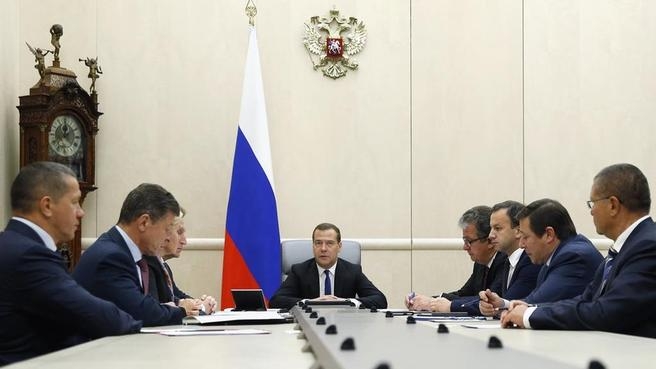Meeting with Deputy Prime Ministers.
Dmitry
Medvedev: Turning
to international affairs, Mr Ulyukayev held consultations with our European and
Ukrainian colleagues regarding the association agreement between Ukraine and
the European Union, including how it could impact the economy of the Russian
Federation. Please brief us on the results you managed to achieve and on what
we are planning to do.
Alexei Ulyukayev: Mr Medvedev, colleagues, we were following the instruction given by the President prior to the trilateral ministerial meeting in Brussels – on doing everything we can to find a compromise. On 12 September I held long, tough talks with EU Trade Commissioner Karel De Gucht and Ukrainian Foreign Minister Pavel Klimkin. The compromise laid out in the corresponding document entails the following.
First, after Ukraine ratifies the agreement, implementation will not begin for 15 months, or before 31 December 2015.
Second, during that period, the unilateral preferences Ukraine already receives from the European Union will remain in effect.
Third, during that period, the preferential trade arrangement between Ukraine and the Russian Federation will continue within the framework of the CIS free trade area, that is, the current status quo will continue.
Fourth, the Russian Federation’s concerns about a number of issues are recognised. Let me remind you that we are talking about five positions – tariff liberalisation, technical regulations, sanitary and phytosanitary monitoring, customs administration, and energy. These concerns are recognised, and the parties commit to continuing the search for ways to address these concerns in this trilateral format.
In order to clarify some legal and technical issues, after the phone conversation I had with you and the President, I wrote a letter to my colleagues, the European Commissioner for Trade and Ukrainian Foreign Minister, which states the following.
First, we believe it is necessary to have these agreements legally formalised by the Council of Ministers of the European Community and Ukraine’s parliament as part of the ratification process.
Second, we drew our colleagues’ attention to the fact that the so called creeping implementation – that is, taking a decision that would not formally begin implementation but would in fact introduce it into a certain stage – would be regarded by us as a violation of the agreement, and we reserve the right to cancel our preferential trade arrangement with Ukraine and to take other actions in case of violations.
And third, we confirm our readiness and intention to work within the trilateral framework to find answers to these questions and to amend the agreement. Mr Medvedev, we propose setting up a special group within the Ministry of Economic Development to monitor Ukrainian legislation and the practical steps taken by Ukraine. The group would involve the participation of Ministry of Industry and Trade, Ministry of Agriculture, the Federal Service for Veterinary and Phytosanitary Supervision, the Federal Customs Service, and other federal agencies, if necessary.
Dmitry Medvedev: I totally support the idea of a working group. I will issue instructions to the agencies to launch these activities with the Ministry of Economic Development in the lead.
Mr Shuvalov, I would also like you to monitor the situation on the ground as the point man on this.
Igor Shuvalov: Of course.
Dmitry Medvedev: Apparently, our negotiating partners have heeded some of our arguments. This is important. And naturally we are ready to honour these agreements if they are properly formalised, as Mr Ulyukayev just said, because in this case, in this situation, a written statement will not suffice. There needs to be some kind of obligations for the relationship participants.
At the same time, it is clear that, given the absence of the so-called provisional application and the continuation of the free trade zone regime, that is, the preferential trade arrangement with Ukraine, we are going to keep a close eye on the situation, all the more so as our European partners are extending unilateral preferences to Ukraine. That’s their right. But we should see to it that there is no covert implementation, that is, the hidden application of these rules, for instance, without a separate act authorising it – in other words, through taking practical steps. If we do see this, we will have to issue the document which is now posted for everyone to see on our site concerning the shifting from our preferential trade arrangement with Ukraine, which is a special arrangement within the free trade zone, to a regular trade arrangement within existing rules on most-favoured nation status, which is how we trade with all other partners outside the free trade zone. This would naturally totally change the character of our trade relations with Ukraine.
So I would like to ask all responsible agencies to monitor the situation, and to report to me if there are any signs of such actions. If that happens, we’ll coordinate with you on how to proceed.









